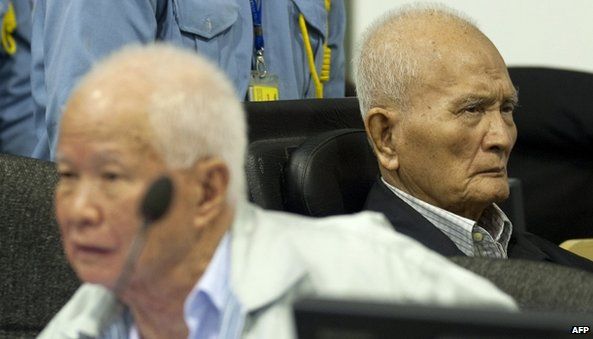Former Khmer Rouge leaders begin genocide trial
- Published

The last two surviving leaders of Cambodia's Khmer Rouge regime are to begin their second trial in Phnom Penh.
Khieu Samphan, the former head of state, and Nuon Chea, Pol Pot's deputy, are already on trial for war crimes and crimes against humanity.
The second trial includes a charge of genocide related to killings of Vietnamese and Cham Muslim minorities.
The cases are being tried separately to accelerate proceedings, because the defendants are elderly.
A verdict in the first case, meanwhile, is expected on 7 August. Prosecutors are seeking life sentences for the two former leaders.
The Khmer Rouge ruled Cambodia for four years, from 1975 to 1979. Up to two million people are thought to have died of starvation, overwork or by execution under the brutal Maoist regime.
Leader Pol Pot died in 1997 and only one senior official - former prison chief Duch - has been convicted and jailed for crimes committed by the regime.
Two other leaders were to be tried, but Ieng Sary - the former foreign minister - died last year and his wife, former social affairs minister Ieng Thirith, was ruled unfit to stand trial.
The first trial has largely focused on crimes committed as the urban population was forcibly moved into rural labour camps.
The second trial will address the roles of Nuon Chea, 88, and Khieu Samphan, 83, in the killings of tens - possibly hundreds - of thousands of people from Cambodia's ethnic minority groups.
The issue of forced marriages and rape will also be covered by proceedings.
The opening hearing takes place today, with the trial expected to continue possibly until 2016.
- Published31 October 2013
- Published21 October 2013
- Published16 October 2013
- Published31 May 2013
- Published14 March 2013
- Published21 November 2011